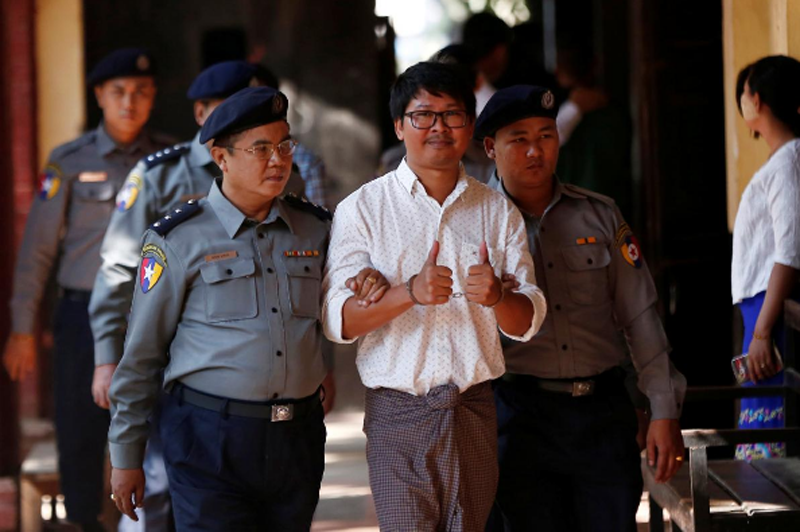Myanmar policeman who arrested Reuters reporters tells court he burned his notes
YANGON: A Myanmar police officer who was part of the team that arrested two Reuters journalists in December told a court on Tuesday that he had burned the notes he made at the time, but gave no reason why he had done so.
Police Second Lieutenant Tin Htwe Oo was the latest prosecution witness to give evidence at the Insein district court in Yangon, which will decide whether reporters Wa Lone, 31, and Kyaw Soe Oo, 27, should be charged under Myanmar’s colonial-era Official Secrets Act.
Tin Htwe Oo read from a notebook to recount details of the arrest, which he said was based on notes written at the time. Under cross-examination by the defense, he said he had burned his original notes, but had not been instructed to do so.
“Only the police will know the reason for that,” defense lawyer Than Zaw Aung told reporters after the hearing.
Dozens of reporters and diplomats were present when the Reuters journalists were brought in handcuffs from prison to the crowded courtroom.
They had worked on Reuters coverage of a crisis in Rakhine state, where an army crackdown on insurgents since the end of August has triggered the flight of 688,000 Rohingya Muslims to Bangladesh, according to the United Nations.
GRAPHIC - Arrested Reuters Reporters - here
Wa Lone and Kyaw Soe Oo were detained on Dec. 12 after they had been invited to meet police officers over dinner in Yangon. They have told relatives they were arrested almost immediately after being handed some documents at a restaurant by two officers they had not met before.
Tin Htwe Oo made no reference to the restaurant meeting, saying police stopped the two reporters as they walked along a road. He said after stopping them, police discovered secret documents relating to the Rakhine conflict.
The arresting officers made an inventory of around 20 items in their possession – including their cell phone numbers and details of ATM and library cards – on the spot within 10-15 minutes, he said.
Defense lawyer Than Zaw Aung said he had asked Tin Htwe Oo repeatedly in cross-examination how they had been able to do this so quickly, but said he did not give a clear response.
“They were saying that it only took 10 to 15 minutes but items found from the reporters were phones and cards and it will take around 30 minutes to record those,” Than Zaw Aung said.
CALLS FOR RELEASE
At the last court hearing on Thursday, another prosecution witness, Police Major Min Thant, agreed during cross-examination by the defense that the information in documents that Wa Lone and Kyaw Soe Oo were holding in their hands at the time of their arrest had already been published in newspaper reports.
“Wa Lone and Kyaw Soe Oo are journalists who perform a crucial role in shedding light on issues of global interest,” Reuters said in a statement after the proceedings ended for the day.
“We believe that the ongoing court proceedings will demonstrate their innocence and they will be able to return to their jobs reporting on events in Myanmar. We are grateful for the expressions of support for Wa Lone and Kyaw Soe Oo and continue to call for their prompt release.”
The two reporters, whose application for bail was declined at the last hearing, have now been in detention for eight weeks, first in police custody and then in Yangon’s notorious Insein prison.
“We feel there’s no justice,” Wa Lone shouted as he and Kyaw Soe Oo were led to a police truck after the hearing. “The testimonies from the police officers are far from the truth.”
Spokesmen for the Ministry of Home Affairs and the Yangon police chief were not immediately available for comment. In the past they have declined to comment on a case that is before the courts.
The Official Secrets Act dates back to 1923 - when Myanmar, then known as Burma, was under British rule - and carries a maximum prison sentence of 14 years.
The two journalists have been accused under Section 3.1 (c) of the act, which covers entering prohibited places, and taking images or obtaining secret official documents that “might be or is intended to be, directly or indirectly, useful to an enemy”.
Government officials from some of the world’s major nations, including the United States, Britain and Canada, as well as top UN officials, have called for the reporters to be freed.
The date of the next hearing was set for Feb. 14.






